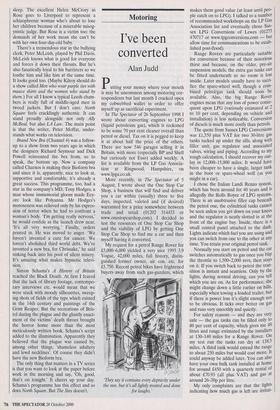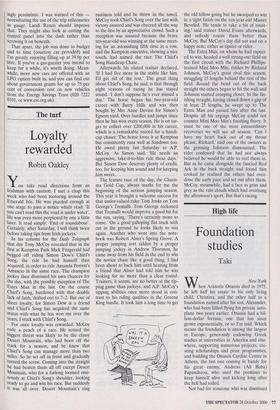Motoring
I've been converted
Alan Judd
Putting your money where your mouth is may be uncommon among motoring cor- respondents but last month I cracked open my cobwebbed wallet in order to offer myself up as sacrificial experiment.
In The Spectator of 26 September 1998 I wrote about converting engines to LPG (liquid petroleum gas), which is reckoned to be some 70 per cent cleaner overall than petrol or diesel. Tax on it is pegged to keep it at about half the price of the others. There are now 546 garages selling it in Britain, with more (especially BP and Shell but curiously not Esso) added weekly. A list is available from the LP Gas Associa- tion at Ringwood, Hampshire, on www.lpga.co.uk.
More recently, in The Spectator of 5 August, I wrote about the One Stop Car Shop, a business that will find and deliver you a ear within (usually) three to five days, inspected, valeted and (if desired) warranted for a price somewhere between trade and retail (01202 314433 or www.onestopcarshop.com). I decided to test the resources of One Stop Car Shop and the viability of LPG by getting One Stop Car Shop to find me a car and then myself having it converted.
My request for a petrol Range Rover for £5,000-6,000 yielded a very nice 1993 3.9 Vogue, 42,000 miles, full history, distin- guished former owner, air con. etc. for £5,750. Recent petrol hikes have frightened buyers away from such gas-guzzlers, which `They say it contains every depravity under the sun, but its all lightly treated and done for laughs.' makes them good value (at least until peo- ple catch on to LPG). I talked to a number of recommended workshops on the LP Gas Association list and eventually chose Sus- sex LPG Conversions of Lewes (01273 470717 or www.lpgconversions.com — but allow time for communications to be estab- lished post-flood). Range Rovers are particularly suitable for conversion because of their notorious thirst and because, on the older, pre-air suspension models, the extra gas tanks can be fitted underneath so no room is lost inside. Later models usually have to sacri- fice the spare-wheel well, though a com- bined petrol/gas tank should soon be available. Also, the big Range Rover engines mean that any loss of power conse- quent upon LPG (variously estimated at 2 to 10 per cent, depending on vehicle and installation) is less noticeable. Conversion of diesels is much more costly than petrols. The quote from Sussex LPG Conversions was £1,550 plus VAT for two 30-litre gas tanks tucked up under the sills, along with filler unit, gas regulator and associated valves, wiring and piping. According to my rough calculation, I should recover my out- lay in 12,000-15,000 miles. It would have been cheaper to have a single, larger tank in the boot or spare-wheel well (as you might in a car). I chose the Italian Landi Renzo system, which has been around for 40 years and is allegedly the Rolls Royce of LPG systems. There is an unobtrusive filler cap beneath the petrol one, the cylindrical tanks cannot be seen unless you get down on your knees and the regulator is neatly slotted in at the front of the engine bay. Inside, there is a small control panel attached to the dash. Lights indicate which fuel you are using and you can switch from one to the other at any time. You retain your original petrol tank. Normally you start on petrol and the car switches automatically to gas once you blip the throttle to 1,500-2,000 revs, then stays on it. If you switch back to petrol the tran- sition is instant and seamless. Only by the lights, during normal driving, can you tell which you are on. As for performance, she might change down a little earlier on hills, especially when towing a loaded trailer, but if there is power loss it's slight enough not to be obvious. It ticks over better on gas and runs very smoothly and quietly.
For safety reasons — and they are very safe — the gas tanks can be filled only to 80 per cent of capacity, which gives me 48 litres and range estimated by the installers at 130-140 miles for a Range Rover. On my test run the tanks ran dry at 138.5 miles. A third tank would extend the range to about 250 miles but would cost more. It could anyway be added later. You can also have your own bulk tank installed at home for around £450 with a quarterly rental of about £70.93 (all plus VAT) and gas at around 26-30p per litre. My only complaints are that the lights indicating how much gas is left are irritat- ingly pessimistic. I was warned of this necessitating the use of the trip mileometer as gauge. Landi Renzo should improve that. They might also look at cutting the control panel into the dash rather than screwing it on beneath.
That apart, the job was done to budget and to time (courtesy car provided) and I'm greatly enjoying filling up at 39.9p per litre. If you've a gas-guzzler you intend to keep for a while, it's worth doing. Mean- while, more new cars are offered with an LPG option built in, and you can find out about government grants for up to 75 per cent of conversion cost on new vehicles from the Energy Savings Trust (020 7222 0101, or www.est.org.uk).



























































































 Previous page
Previous page